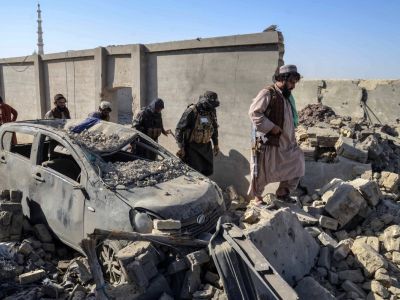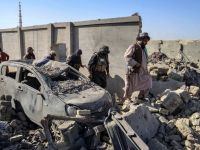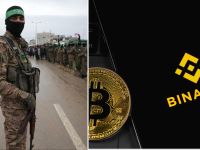Taliban fighters besieged in Kunduz, one of their few remaining pockets of resistance in Afghanistan, offered a conditional surrender Monday as pressure mounted on their Northern Alliance foes to form a government representing the various Afghan factions.
US Secretary of State Colin Powell vowed that Osama bin Laden, the main suspect in the September 11 terror attacks that claimed some 5,000 lives in the United States, would be captured.
After the Northern Alliance's acting interior minister Younis Qanooni claimed Sunday that bin Laden is hiding at a base near Maruf, 130 kilometers (80 miles) east of the Taliban stronghold of Kandahar, Powell said the Saudi-born extremist's capture was a matter of time.
"We're going to get him out of his hole sooner or later, but we'll get him," he said, adding that he would not be surprised if a Taliban member eventually revealed where bin Laden is hiding.
"As they start to realize that there is no future hanging around with either the al-Qaeda organization or, for that matter, with the Taliban regime, it wouldn't surprise me to see some people start to make more informed choices about where their best interests lie," he said.
Taliban commander Mullah Fazil, saying US air strikes killed more than 1,000 people in and around Kunduz over the weekend, offered to surrender but only under United Nations supervision.
"We have authorized the governor of the province to take necessary steps in this respect," Fazil, described as the chief Taliban commander in the north, told the newspaper.
But Fazil said the Taliban would under no circumstances surrender to the Northern Alliance after hearing reports of bloody reprisals after the fall of Kabul and Mazar-i-Sharif.
"We don't trust them," he said.
Fazil said other conditions for surrender included safe passage home for the fighters, the right to hand their heavy weapons over to neutral caretakers and for foreign fighters -- including al-Qaeda troops -- to be repatriated through UN auspices.
Estimates of the number of besieged troops at Kunduz run between 20,000 and 30,000, about one third of them foreigners -- including Pakistanis, Arabs and Cehechens -- linked to al-Qaeda.
Northern Alliance forces exchanged sporadic mortar and machine-gun fire with the Islamic militia around Kunduz on Monday, and a tank took several shots at a Taliban trench from a surrounding hill.
A US plane flew overhead but did not drop any bombs.
In Kandahar, the other major pocket of Taliban resistance, militia commanders were reported negotiating with tribal leaders for a peaceful handover of power in the city.
"Soon, as a result of contacts and negotiations, the situation in Kandahar will be peacefully solved," Hamid Karzai, a top Pashtun leader and a former Afghan deputy foreign minister, said Sunday.
In Kabul, UN envoy Francesc Vendrell was scheduled to hold a second meeting with Burhanuddin Rabbani, the UN-recognized president of Afghanistan who was ousted by the Taliban five years ago, to discuss a planned inter-Afghan conference.
In their first talks Sunday, Vendrell urged the Alliance to meet other factions in a neutral country and Rabbani's UN representative, Haron Amin, said a delegation should be heading "hopefully soon" to Europe for an inter-Afghan conference, possibly in Germany.
Rabbani, who returned to Kabul on Saturday, has sought to dispel fears that his return could lead to a repetition of the civil strife and corruption that marked his previous reign, from 1992 to 1996.
"We came to Kabul to call for peace," he was quoted as saying Sunday, as the UN and US pressure mounted for the creation of a representative government that would avoid a repetition of past infighting.
The Northern Alliance is a loose coalition of the country's Tajik, Uzbek, Hazara and other minorities, and their last experience in power under Rabbani resulted in a bloody civil war that devastated Kabul.
The country's Pashtun majority is currently represented by the Taliban, and US and UN officials hope the former Afghan king, Mohammed Zahir Shah, also a Pashtun, can play a unifying role despite being 87-years-old and having spent 28 years in exile.
"I think the king plays an important role, a symbolic role," Powell said Sunday. "I don't want to prejudge what the discussions might lead to, but it seems to me that his role would continue to be symbolic, as opposed to being the executive or the chief executive of the new government."
But the ex-king's supporters have been complaining bitterly that the Northern Alliance sidelined them after stunning military victories gave them control of nearly two thirds of the country compared to only one tenth before the October 7 start of the US-led military campaign.
Karzai said some high-ranking Taliban officials, considered to be moderates, had shown interest in joining efforts to form a new government, but the US national security adviser Condoleezza Rice scotched the idea.
"I don't think the words 'moderate' and 'Taliban' go in the same sentence, frankly," she said Sunday.
A top-level Russian delegation is in Kabul, where it arrived Sunday for secretive talks on the future of Afghanistan, which is also under discussion in a series of meetings in neighboring Pakistan, home to a strong Pashtun community.
Egyptian Foreign Minister Ahmed Maher held talks Monday with his Pakistani counterpart Abdul Sattar, and Deputy Foreign Minister Mohsin Aminzadeh of Iran, Afghanistan's western neighbor, also arrived for two days of talks.
There has been recent grumbling in the Northern Alliance about the scope of foreign influence in post-Taliban Afghanistan, highlighted by the rejection Sunday of an expected influx troops from the US-led coalition.
After the arrival of 100 British marines at Bagram air base near Kabul to prepare the ground for a larger deployment and a French announcement that it will send commandos to Mazar-i-Sharif, Alliance officials warned that foreign troops must play only a humanitarian role.
"We see no need" for more foreign troops, the Alliance's acting interior minister Younis Qanooni said Sunday, while defense minister Mohammad Quassim Fahim told AFP the British soldiers in Bagram were operating without the agreement of the anti-Taliban alliance.
"The British forces perhaps have an agreement with the UN but not with us," he said -- Kabul (AFP)
© 2001 Al Bawaba (www.albawaba.com)









